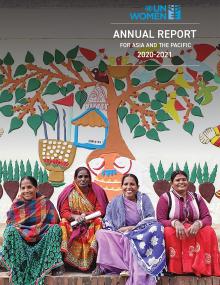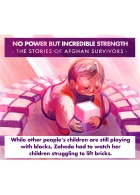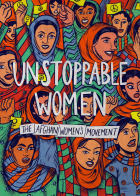Date:
This brief explores the nexus approach for addressing GBV and identifies some of the key considerations for development actors* when preparing for and responding to GBV in emergencies and provides specific recommendations to governments and national organizations for integrating humanitarian considerations into development planning, policies, and programming
Date:
This brief explains key concepts related to gender-transformative approaches, accompanied by examples to support organizations in Myanmar to apply them more confidently in their Women, Peace, and Security (WPS) programming.
Date:
The project is designed to enhance rural women’s access to and use of renewable energy in agricultural business in Qinghai Province and promote women’s participation and leadership in green transition in general.
Date:
This policy brief examines the impacts of heat waves and drought on women’s food security, economic productivity, and care work, and highlights the alarming occurrence of gender-based and sexual violence during climate-induced challenges. It provides a set of proactive and gender-transformative recommendations for humanitarian and disaster risk reduction practitioners to improve preparedness efforts.
Date:
This is a crucial document which represents a collective voice, uniting women from different backgrounds and generations who face multifaceted challenges and are deprived of certain opportunities.
Date:
FYLP follows a ground-up approach to understanding, operationalising, and building resources for feminist youth leadership in India, while simultaneously unpacking the context in which these are embedded. The Workbook is one of the Knowledge Products from the programme.
Date:
This country profile provides an overview of the crisis in Myanmar, how the UN Women Myanmar team and our partners are supporting vulnerable women and girls, and our 2024-2025 strategic priorities.
Date:
FYLP follows a ground-up approach to understanding, operationalising, and building resources for feminist youth leadership in India, while simultaneously unpacking the context in which these are embedded.
Date:
Through this project, they took on the task of advancing the Generation Equality Forum mandate by creating a contextual programme around building feminist youth leadership in India. FYLP follows a ground-up approach to understanding, operationalising, and building resources for feminist youth leadership in India.
Date:
The Literature Review is one of the Knowledge Products from the programme. The project, they took on the task of advancing the Generation Equality Forum mandate by creating a contextual programme around building feminist youth leadership in India. FYLP follows a ground-up approach to understanding, operationalising, and building resources for feminist youth leadership in India
Date:
The brief was developed in response to feedback from women-led civil society and women’s rights organizations about topics they would like to increase their knowledge on.
Date:
The book "Women in Action" comprises inspiring stories of five women and girls who were part of a project aimed at empowering them. Written from their perspective, these stories depict their struggles, ambitions, and the barriers they have overcome.
Date:
This report provides an overview of the International Conference on Ending Gender-Based Killings of Women and Girls and the latest information on femicide worldwide.
Date:
Aspiring to function as a knowledge and partnership hub for the Asia-Pacific region, the Centre collaborates closely with both Korean and regional stakeholders. It strives to engage in meaningful activities that highlight the importance of gender equality and enhance the capacities of policymakers and practitioners in both the public and private sectors.
Date:
To address needs raised by multiple agencies and organizations, SAF proposed the development of a desk review; a practical, basic inter-agency regional guidance note; and a training tool. The desk review compiles existing information and identifies key gaps and opportunities to strengthen GBV referral systems will inform the development of the guidance note.
Date:
UN Women Afghanistan and IOM commissioned this booklet, which illustrates the stories of several Afghan women survivors of the devastating earthquakes and forced returns from Pakistan that have rocked so many lives in recent months. You will not read their stories in the media or see their names in history books. But we must not forget them. Their fight is our global fight.
Date:
UN Women Afghanistan commissioned this graphic novel, co-produced by Afghan women, to bring to life Afghan women’s powerful advocacy and incredible resilience in the most oppressive circumstances. Stories of loss reverberate throughout Afghanistan. But there is also hope even in the face of such loss. Afghan women don’t accept the restrictions imposed on their rights. Afghan women will not give up. They are unstoppable.
Date:
These sessions marked the culmination of the piloting phase of the Essential Services Package (ESP) programme, an initiative aimed at providing greater access to a coordinated set of essential and quality multi-sectoral services for all women and girls who have experienced gender-based violence.
Date:
Since the Taliban takeover of Afghanistan on 15 August 2021, women’s participation in daily and public life has contracted significantly as de facto authorities have taken steps to limit women’s freedom of movement, access to work and education, and exercise of other fundamental rights and freedoms. In parallel, civic space and media freedoms have diminished. In this context, digital space has provided a vital outlet for Afghans
Date:
The manual is meant to support primarily policymakers, practitioners and service providers who can advocate for and enhance a whole-of-government and whole-of-society approach in developing and implementing reintegration policies and practices in a coordinated manner.

![[cover]](/sites/default/files/styles/search_image_140px/public/2024-04/ap-c821-final_gbv-aor-hd-2023-hdp-960px.jpg?itok=7QcndZXG)
![[cover]](/sites/default/files/styles/search_image_140px/public/2024-04/mn-c825-myanmar-wps-brief2-cover-960px.jpg?itok=noAzVn0D)
![[cover]](/sites/default/files/styles/search_image_140px/public/2024-04/cn-c820-0422cn_women-led-rural-community-renewable-960px.jpg?itok=hHliwGE9)
![[cover]](/sites/default/files/styles/search_image_140px/public/2024-04/ap-c813-policy-brief_gendered-impacts-of-heat-waves-and-drought-960px.jpg?itok=nkcudTfi)
![[cover]](/sites/default/files/styles/search_image_140px/public/2024-04/bd-c801-charter-of-demand-english-960px.jpg?itok=SnqcZD0C)
![[cover]](/sites/default/files/styles/search_image_140px/public/2024-04/in-c772-workbook_fylp-960px.jpg?itok=oRmlebPr)
![[cover]](/sites/default/files/styles/search_image_140px/public/2024-04/mn-unwomenmyanmar-202425-country-profile-960px.jpg?itok=OJWavNkw)
![[cover]](/sites/default/files/styles/search_image_140px/public/2024-04/in-c770-needs-assessment_cover-960px.jpg?itok=Ts5kue8q)
![[cover]](/sites/default/files/styles/search_image_140px/public/2024-04/in-c771-resource-toolkit_fylp-960px.jpg?itok=agxYmOGd)
![[cover]](/sites/default/files/styles/search_image_140px/public/2024-03/in-769-literature-review_1679px.jpg?itok=PWEn2Wuq)
![[cover]](/sites/default/files/styles/search_image_140px/public/2024-03/mn-c748-myanmar-wps-brief_march2024_eng-960px.jpg?itok=ImI653eM)
![[cover]](/sites/default/files/styles/search_image_140px/public/2024-03/in-c747-women-in-action-960px.jpg?itok=ViYATeer)
![[cover]](/sites/default/files/styles/search_image_140px/public/2024-03/coe-c739-femicide-in-brief_960px.jpg?itok=YERCusqb)
![[cover]](/sites/default/files/styles/search_image_140px/public/2024-03/coe-c724-centre-brochure-960px.jpg?itok=2s_Up_gQ)
![[cover]](/sites/default/files/styles/search_image_140px/public/2024-03/ap-c728-desk-review-cross-border-referral-1.jpg?itok=ujCMCbjK)


![[cover]](/sites/default/files/styles/search_image_140px/public/2024-03/ap-c682-CO-LEARNING-ESP-SESSIONS_960px.jpg?itok=VBuiKo6g)
![[cover]](/sites/default/files/styles/search_image_140px/public/2024-02/af-c657-online-protection-and-digital-security-eng-960px.jpg?itok=AkJe3Rz4)
![[cover]](/sites/default/files/styles/search_image_140px/public/2024-02/bd-c652-pub2023027-el-regional-reintegration-960px.jpg?itok=wuXlDf41)